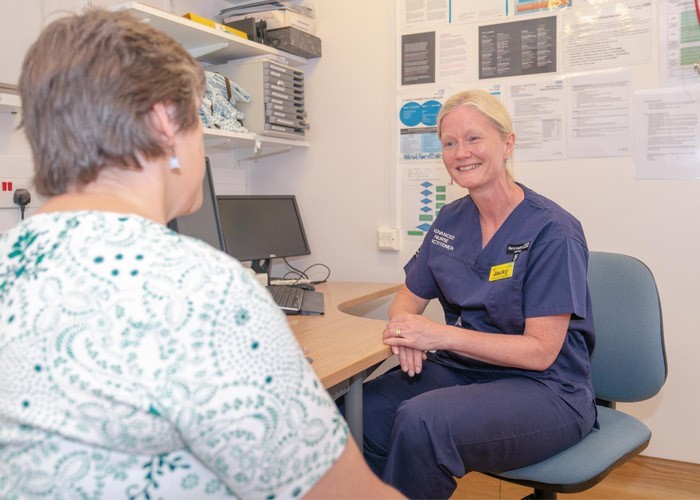We explain the actions that need to be taken to ensure that we can move forwards from the disruption caused to breast cancer services by the pandemic.
We explain the actions that need to be taken to ensure that we can move forwards from the disruption caused to breast cancer services by the pandemic.

The current coronavirus pandemic is having a huge impact on the diagnosis, treatment, care and experiences of people living with breast cancer.
During the height of the first wave we have seen the breast screening programme pause, referrals to see a specialist drop, changes to treatment, disruption to clinical trials and patients reporting less contact with healthcare professionals.
From our research, we have found that 78% of people with breast cancer felt the pandemic had impacted on their treatment and care.
Our report Press Play: getting and keeping breast cancer services back on track highlights the actions that need to be taken to move forwards from the disruption caused by the pandemic.
Diagnosis
The earlier breast cancer is diagnosed, the more likely it is that treatment will be successful. We have estimated that there is a backlog of nearly a million women in the UK requiring breast screening as a result of the pause to the programme. We have also seen the number of referrals for suspected cancer drop, we estimate that across the UK there is likely to have been nearly 107,000 fewer referrals between March and July compared to 2019.
However as the number of referrals starts to increase and screening starts to resume there is likely to be a huge influx and demand for imaging and diagnostics.
Moving forward governments and the NHS across the UK must:
- Ensure that cancer recovery plans set out how the influx of demand for imaging and diagnostics will be safely managed.
- Continue to encourage people with signs and symptoms of breast cancer to get checked out.
- Assess diagnostic capacity across breast cancer services and set out a demand led, long-term plan to ensure the workforce has enough resource and support now and in the future. We are calling for the Government to invest in the imaging and diagnostics workforce as part of the Comprehensive Spending Review.
Treatment
A significant proportion of respondents to our survey did not experience changes to their treatment. However, others told us that their treatment had been cancelled, delayed or changed as a result of the pandemic.
Just over half of respondents to our survey (52%) described their treatment and care as positive or very positive. However, for those who were receiving or awaiting treatment, only 43% said they definitely felt as involved as they wanted to be in decisions about their treatment and care.
Delays and changes to treatment caused some patients to feel worried about their long-term breast cancer outcomes and had a negative impact on their emotional wellbeing.
Moving forward, governments and the NHS across the UK must:
- Set out how treatment will be safely restored to pre-pandemic levels, and the backlog dealt with. This includes women who were unable to have breast reconstruction during this time.
- Ensure treatment changes introduced during the pandemic, including the reduction in the number of doses of radiotherapy and cycles of adjuvant trastuzumab, which have benefits for patients and the NHS are enabled to continue.
- Identify and address the needs of secondary breast cancer patients, including recognising the importance of drug treatment for these patients.
Clinical trials
Clinical trials provide a vital opportunity for patients to access potential new treatments at an early stage of their development. This is particularly important for women with incurable secondary breast cancer.
The pause in recruitment to many trials will have made it more difficult to access them. The pandemic has also caused delays and disruption to research into breast cancer more broadly. 85% of respondents to our survey were concerned about this. Like many other medical research charities, the research that Breast Cancer Now funds have been impacted by the estimated drop in our income.
Moving forward:
- The National Institute of Health Research (NIHR) and equivalent bodies in the nations should continue to closely monitor the restart of clinical trials and publish information on them, and consider if, and what, further measures could be taken to assist with this.
- The UK Government should provide vital match funding to protect vital charity research through the Comprehensive Spending Review.
Care and support
It has been a very uncertain time for many people living with breast cancer. Many have felt increasingly anxious and worried.
60% of all respondents to our survey felt stressed or anxious. 58% were worried about the future, 38% felt isolated and 35% felt unable to plan for the future.
It is important those living with breast cancer can access the support they need. Whilst the majority of respondents to our survey that accessed support did so through a clinical nurse specialist (CNS), 41% of respondents felt they had less contact with them during this period.
It is vital that support services are included in recovery plans currently being developed by the NHS and governments.
Moving forward, governments and the NHS across the UK must:
- Ensure that the care and support needs of patients are met during this period.
- Secure necessary additional funding to recruit and train more clinical nurse specialists to ensure that everyone with breast cancer- including those with secondary breast cancer - is supported by a CNS. We are calling on the UK Government to provide funding for this as part of the Comprehensive Spending Review.
- Ensure progress towards everyone with breast cancer has personalised care must continue. Care plans should be reconsidered where necessary to take account of changes to people’s treatment during the pandemic.
You can help us press play on getting breast cancer services back on track by joining our campaign to secure extra funding for breast cancer research, diagnosis and care